Functional Digestive Health Testing
Digestive health testing can give you a great clue into any areas of your gut that may be struggling. Your digestive health is critical for your entire health and well-being.
Healthy digestion allows the proper break down of your food and drinks into nutrients allowing your body to absorb them well and use them for energy, growth, and cellular repair. Digestive health is also critical for your healthy immune function, brain and neurological health, energy, skin health, and other areas of your well-being.
In this article, you will learn more about the importance of your digestive health. You will learn about the importance of optimal stomach acid levels, healthy bile flow, and optimal pancreatic enzyme secretion.
I will offer some simple home digestive health testing strategies you can perform to detect stomach acid, bile flow, or pancreatic enzyme secretion dysfunction. I will share why I recommend a Comprehensive Blood Analysis and a GI Map Stool Test for digestive health and what numbers you need to look for to make changes to improve your health.

Importance of Digestive Health
Eating food and drinking fluids is essential for your well-being. However, your body cannot use your food and drinks in the form you see them on your plate. They need to be changed into smaller molecules of nutrients that your blood can absorb and carry to cells all over your body. Digestion is critical for breaking down the food you eat into nutrients that your body can absorb and utilize for energy, cellular repair, and growth.
The digestive system, or gut, start in your mouth where you first take in your food and drinks, then continues onto your esophagus, stomach, small intestine, gallbladder, liver, pancreas, large intestine, colon, and ending with the rectum. Your gut is also part of your body’s core disease-fighting and protective system.
Stomach acids and enzymes sterilize your food in order to protect you from infection and illness. Your digestive health is also important for your immune function, brain and neurological health, energy levels, skin health, and other areas of your well-being. If there is an imbalance within this refined system, it not only leads to digestive health issues but may affect your entire body making you more vulnerable to a variety of symptoms and health concerns (1, 2).
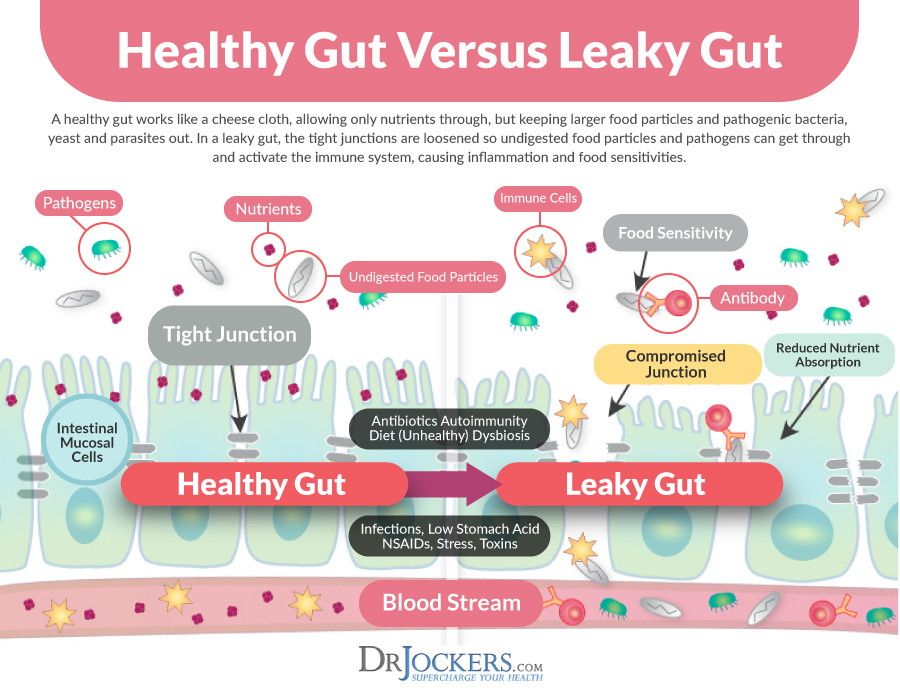
The Importance of Optimal Stomach Acid Levels
Your digestion is a complex process. One of its key players is stomach acid or gastric acid. Stomach acid is a digestive fluid that helps the digestion of food. Its main component is hydrochloric acid (HCI) along with potassium chloride and sodium chloride.
HCI helps your stomach to transform a large solid meal into a semi-liquid soupy substance called chyme that can move through the rest of the digestion process. If there isn’t sufficient HCI production and your stomach acid levels are not optimal, your body cannot break food down properly.
Stomach acid is important for acidifying your stomach, breaking down proteins into more digestible particles, supporting bile and pancreatic enzyme flow, supporting the absorption of minerals, trace elements, vitamins, and other nutrients, killing unwanted microorganisms, protecting your body from infections and pathogen overgrowth, supporting your immune system, and lowering inflammation (3, 4).
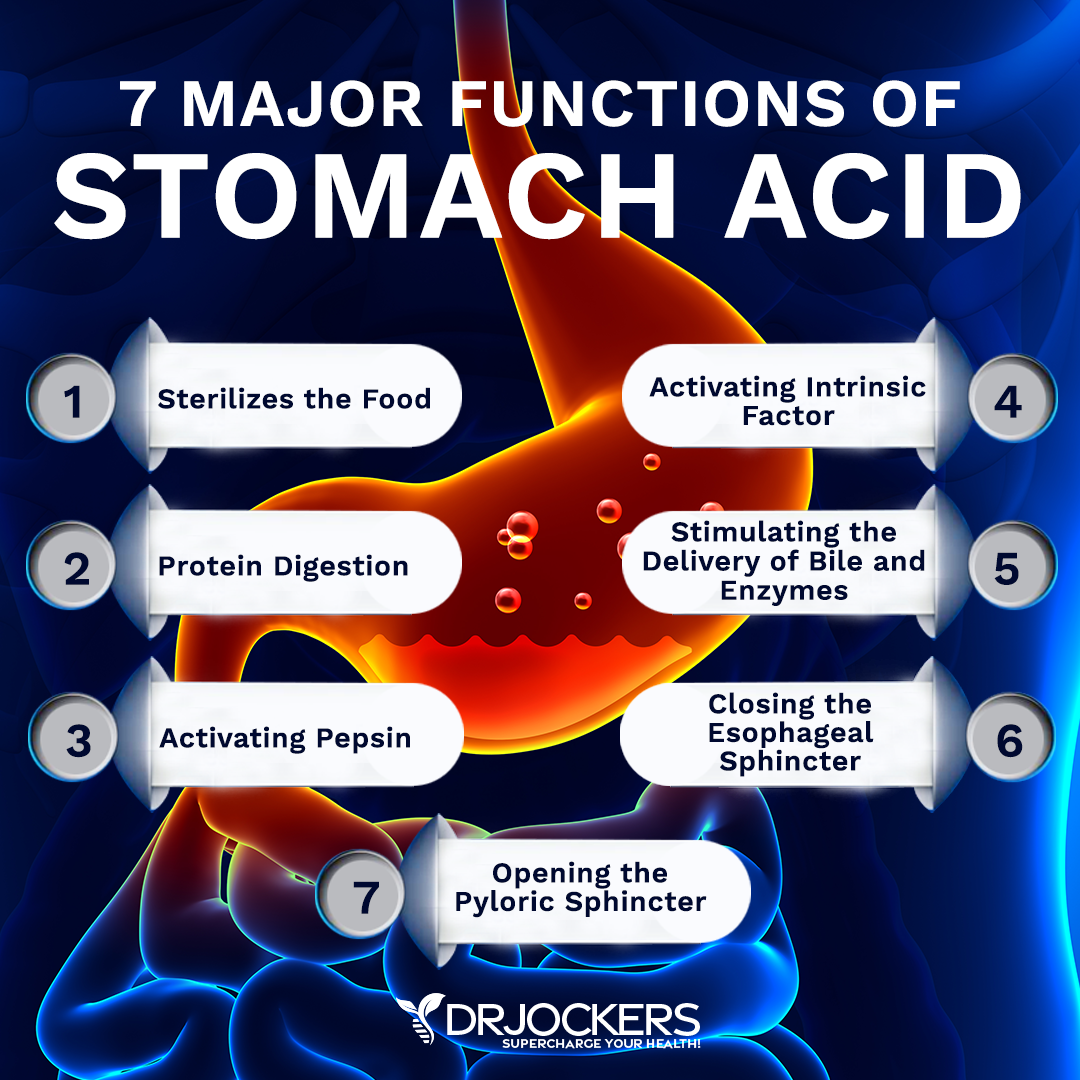
Signs of Poor Stomach Acid Levels
One problem that millions of people experience commonly is poor stomach acid levels. Signs of poor stomach acid levels may include (5):
- Acid reflux
- Heartburn
- Cramping
- Nausea
- Constipation
- Diarrhea
- Undigested food in your stool
- Infections
- Bad breath
- Hair loss
- Dry skin
- Weak hair and nails
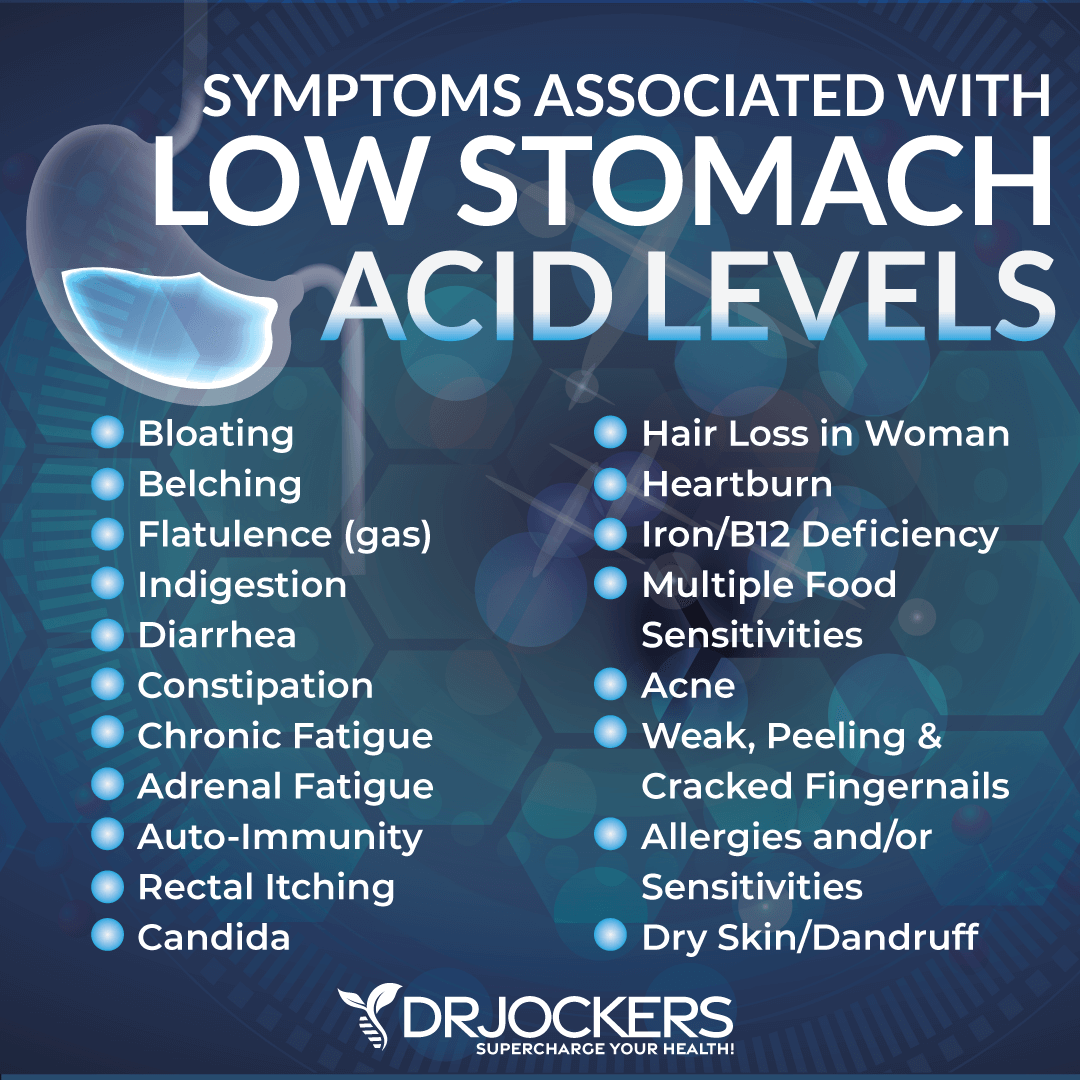
Heartburn is a Symptom of Low Stomach Acid
What most people don’t realize is that heartburn is a symptom of poor stomach acid production and not too much stomach acid production. At rest, our stomach acid environment is at a 3-3.5 pH level. For contrast a neutral pH is 7.0.
In order to effectively digest a protein rich meal, we need to get our stomach acid environment down to a 1.5-2.2 pH level. This is very energy demanding and due to a variety of factors, many people struggle to produce enough acid.
When we don’t produce enough acid, food sits in our stomach longer and begins to ferment and create gas and pressure that opens up the lower esophageal sphincter. The acid that is in the stomach now regurgitates up into the esophagus where the tissue is not protected from the acid and it creates a burning sensation and overtime creates significant damage to the esophagus.
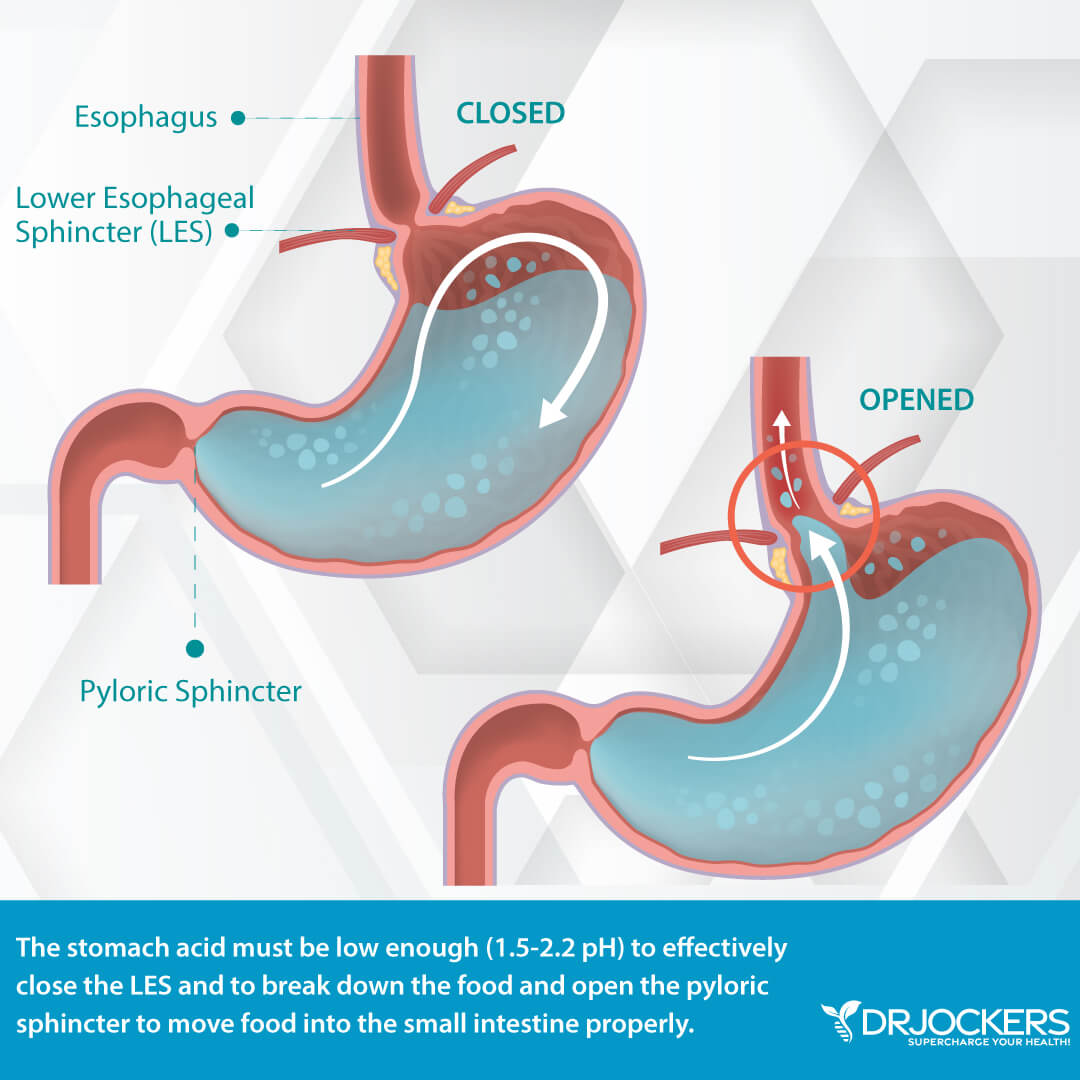
Functional Digestive Health Testing For Stomach Acid
The main causes of poor stomach acid production include chronic stress, aging, H Pylori infection’s, zinc deficiencies, hypothyroidism, poor diet and food sensitivities. All of these things can impair your bodies ability to produce enough stomach acid. As we age, we tend to not produce enough but most commonly when we address the other areas, we can improve and possibly even optimize our levels.
To find out if you have poor stomach acid, there are a variety of simple home tests you may try. The first 2 strategies are easy to do and don’t cost you anything and can give you a lot of helpful information on how well your body is producing stomach acid.
The 3rd test requires the purchase of an inexpensive supplement as you trial it out to see if it improves your digestive health. I would recommend starting with the first 2 strategies and if you are seeing signs of poor stomach acid production then do the Betaine HCL test and see if it improves things. Let’s take a look at these.
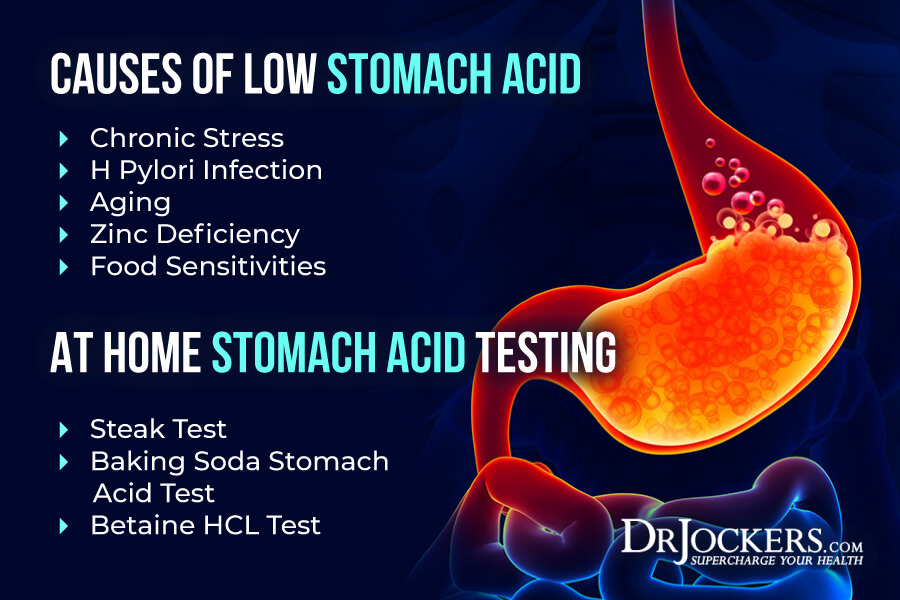
Steak Test
The first test you may try is a steak test. Eat a steak all by itself and see how you feel over the next 3 hours.
If you feel tired, have acid reflux, nausea, gas, bloating, or other symptoms, you may have low stomach acid. If you feel great after eating a steak, you likely have optimal stomach acid levels.
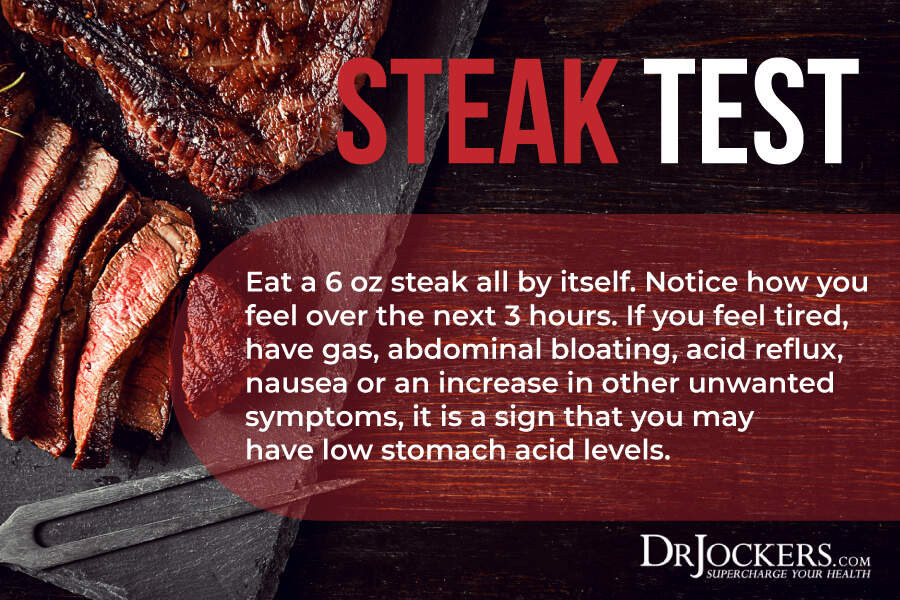
Baking Soda Stomach Acid test
Another test you may try is the baking soda test. Mix ¼ tablespoon of baking soda with 4 – 6 oz of cold water and drink it first thing in the morning before drinking or eating anything. It should make you burp or belch within 3 minutes. Time how long it takes for you to burp or belch.
If it takes longer than 5 minutes, your body likely produces insufficient stomach acid. If you burp or belch very early or several times, it may be due to a hiatal hernia or an excessive amount of stomach acid. Make sure not to confuse these with small burps from swallowing air from drinking too quickly. If you belch after 3 minutes, you may have low stomach acid levels. You may read more about this strategy here.

Betaine HCL Test
Another test you may try is the Betaine HCL test. Buy some Betaine HCL with pepsin, such as Acid Prozyme. Eat a high protein meal with at least 6 ounces of meat.
You may also eat veggies with this meal. In the middle of the meal take your Betaine HCL pill, then watch your symptoms after your meal. If you don’t feel a difference, you may have low stomach acid levels. Keep adding one additional pill with a similar amount of protein at each meal until you get to roughly 1.5 grams of HCL (5 capsules) or until you feel like you digested your meal well or feel heartburn after a meal.
If you notice indigestion, burning, heaviness in your chest, or feeling hot, you may have adequate stomach acid levels. In this case, taking the betaine HCL added more stomach acid then you needed and it caused these unwanted symptoms. At this point, you would back down slightly from wherever your tolerance point was with the betaine HCL or discontinue taking it if it happened with one capsule.
Be aware though that if you don’t consume enough protein, take the capsule too early before the meal, or have a hiatal hernia or an esophageal sphincter dysfunction, you may get a false positive. If you have a history of a stomach ulcer or excessive non-steroidal anti-inflammatory drug usage than you should avoid this test as the betaine HCL may aggravate a weak stomach lining.
To avoid false positives, I recommend that you try this test 2 or 3 times to make sure you have a true positive for each test. If you get 3 positives, check out this article for tips on how to improve your stomach acid.
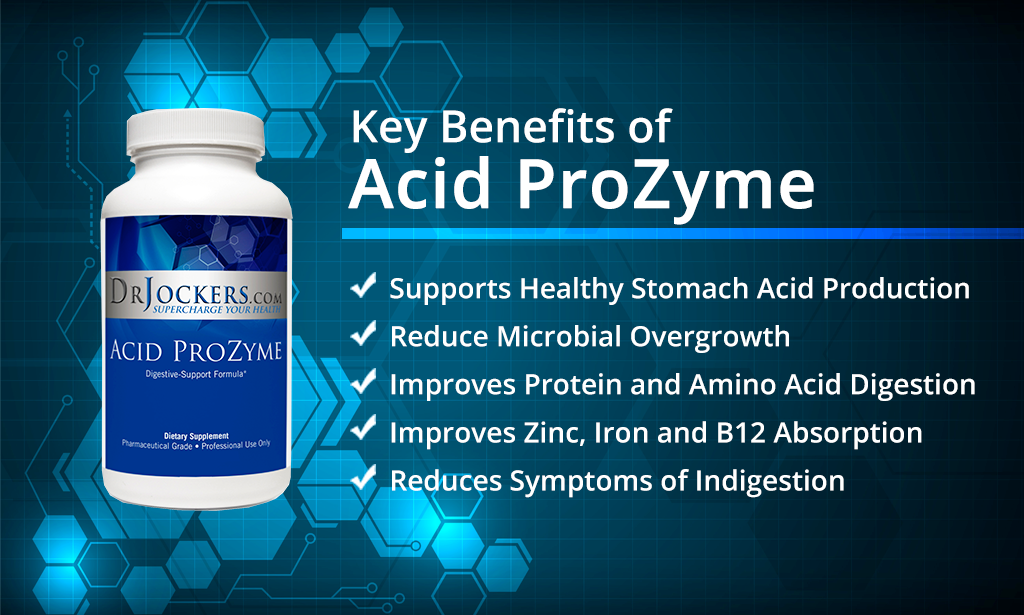
The Importance of Healthy Bile Flow
Bile is an important digestive fluid created and released by your liver and stored in your gallbladder. It helps your body to break down fats into fatty acids and aid digestion and detoxification. Healthy bile flow is essential for your metabolism, thyroid function, and healthy weight (6).
Signs of Poor Bile Flow
Poor bile flow may lead to various digestive health issues. Symptoms of poor bile flow may include (7):
- Diarrhea
- Bad-smelling or trapped gas
- Stomach cramps
- Weight loss
- Pale colored stool
- Erratic bowel movements
There are several home tests you can try to check for poor bile flow. Here is what I recommend:
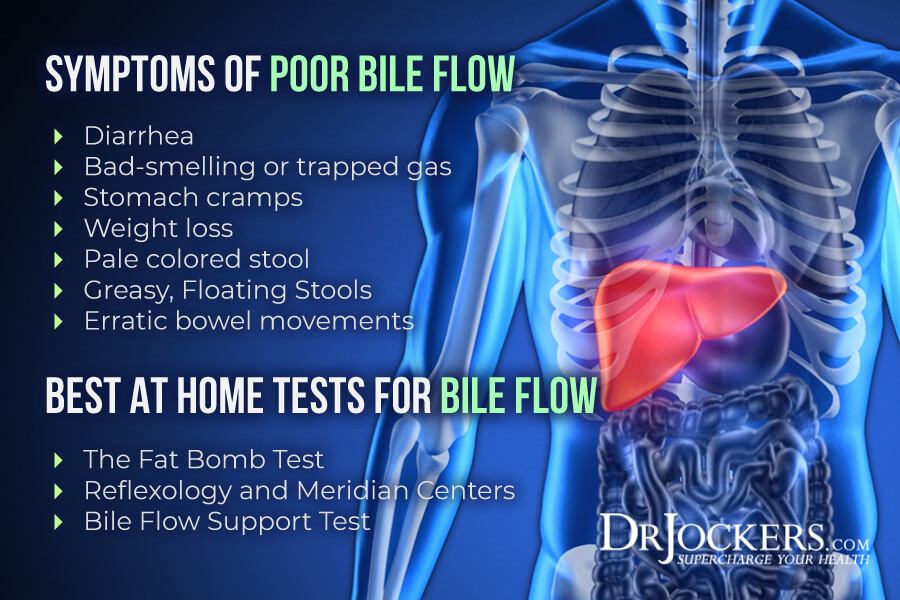
The Fat Bomb Test
The first test you may try is a fat bomb test. Eat 2-3 of these chocolate fat bombs and monitor how you feel over the next 3 hours. The goal is to take in roughly 400-500 grams of mostly fats (coconut based fats, chocolate, almond butter or grass-fed butter is best).
If you feel tired, have acid reflux, nausea, gas, bloating, diarrhea, cramping, floating stool, or other digestive complaints, you may have poor bile flow.
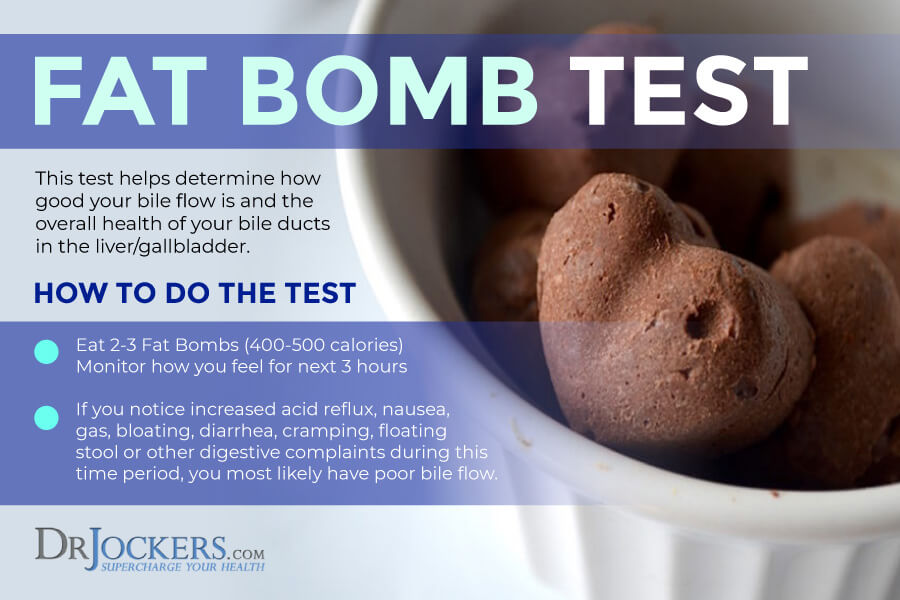
Reflexology and Meridian Centers
Another test I recommend is related to reflexology and your Meridian centers. Chinese medicine has your body mapped out into a specific zone called Meridians to allow healing through reflexology, acupressure, and acupuncture. Pain in any Meridian or trigger point may mean that the energy is stuck and not flowing due to a health issue.
Your gallbladder points include the web between your right thumb and forefinger, between your shoulder blades (especially in your back under the right shoulder blade), across your IT bands and the outer sides of your thighs running from your buttocks to your foot into your 4th toe.
Pain or cramping in these areas, especially between 11 pm and 1 am when the gallbladder is the most active or between 1 am and 3 am when the liver is the most active, may mean that your have poor bile flow or compromised gallbladder and/or liver function. You may learn more about these meridian points and functional health tests for gallbladder problems in this article (8).
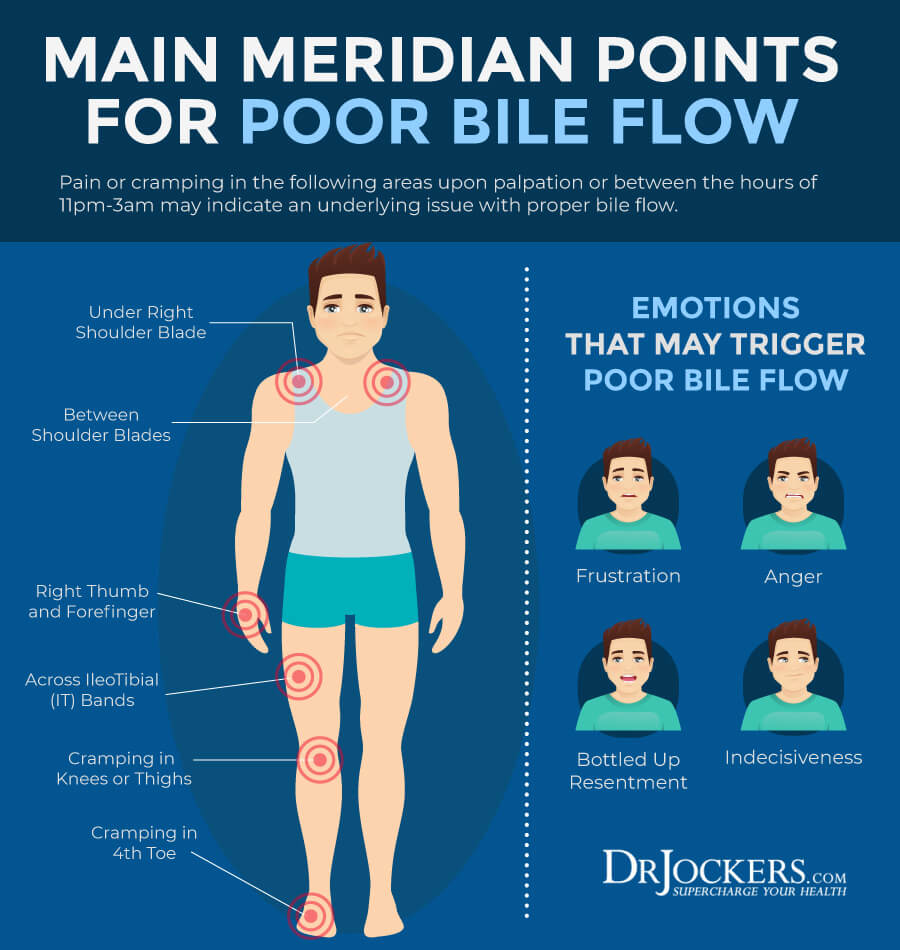
Bile Flow Support Test
The last home test I recommend is the bile flow support test. Take 2 capsules of the Bile Flow Support supplement after meals that are higher in fat and see if you feel better after meals. If you feel better and have improved stools, you may have poor bile flow.
If you can’t get the Bile Flow support, you are looking for a supplement with bile salts such as choline and taurine, nutrients like niacin and inositol and herbs like dandelion, ginger, artichoke, beet or greater calandine. These all act to thin the bile so it will flow more effectively.
The Importance of Pancreatic Enzymes
Pancreatic enzymes are incredibly important for your digestive health. Healthy pancreas secretes about eight cups of pancreatic juice into the duodenum to support digestion.
These pancreatic enzymes help to neutralize stomach acid in the small intestine and help your body to break down fats, proteins, and carbohydrates properly. Since the small intestine is at the beginning of your digestive system, poor pancreatic enzyme secretion may lead to serious digestive issues later down the line (9).
Signs of Poor Pancreatic Enzyme Secretion
Signs of poor pancreatic enzyme secretion is typically associated with small intestinal bacterial overgrowth, or. SIBO. Symptoms may include (10):
- Gas
- Bloating
- Poor tolerance to higher fiber and higher FODMAP foods
- Diarrhea
- Abdominal pain
- Constipation
- Belching
There are a few simple home tests I recommend testing for poor pancreatic enzyme secretion.
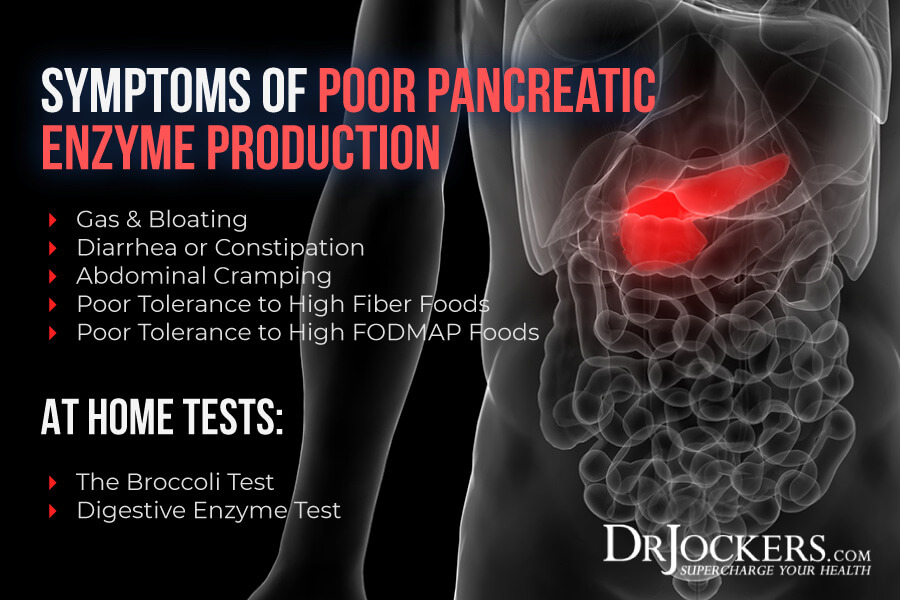
The Broccoli Test
The first test I recommend is the broccoli test. Have a big bowl of steamed broccoli and see how you feel over the next 3 hours.
If you have gas, bloating, cramping, acid reflux, or other digestive symptoms, it means that you may be experiencing signs of bacterial overgrowth and poor pancreatic enzyme function.
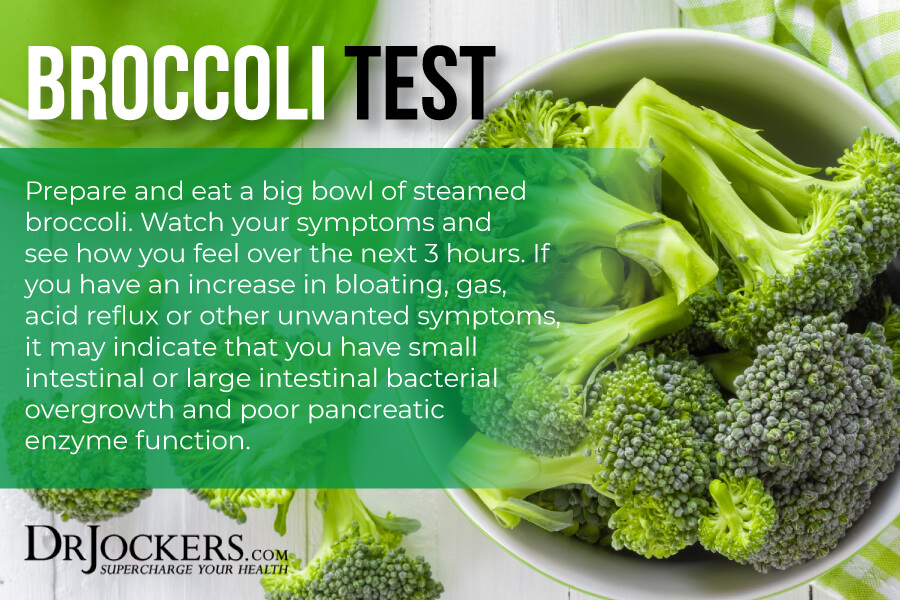
Digestive Enzyme Test
The second digestive health testing strategy I recommend is the digestive enzyme test. Take 2 to 4 digestive enzymes, such as Super D-Zyme with your meals and see if you feel better. If you feel better you may have poor pancreatic enzyme secretion.
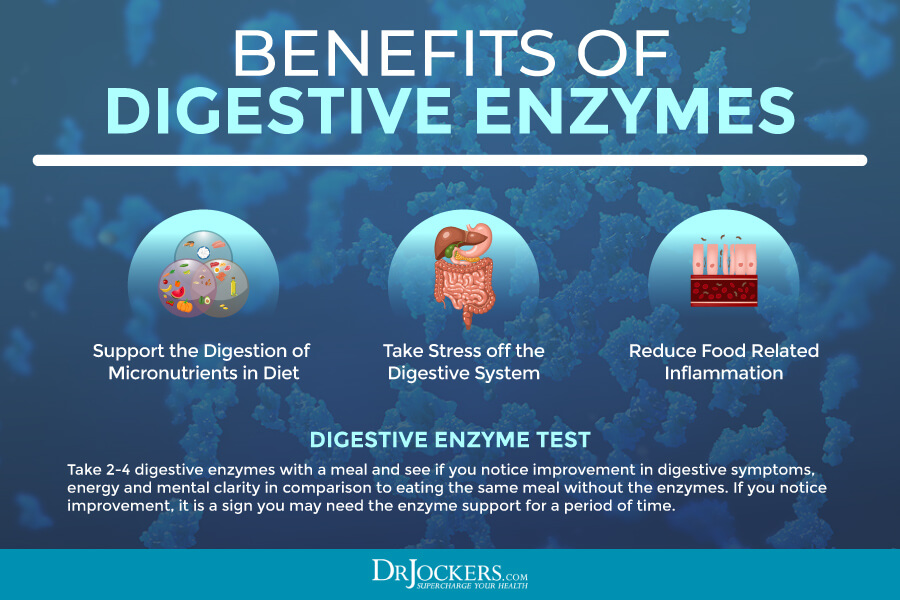
Comprehensive Blood Testing for Digestive Health
While these home tests I recommend are absolutely fantastic for spotting some digestive health problems at the comfort of your home, more testing is important.
I recommend comprehensive blood testing for digestive health to understand your digestive health problems, figure out the underlying issues causing your symptoms, and finding appropriate solutions to support your health.
Key Markers For Stomach Acid Levels
There are several key digestive health testing markers to look for to check for sufficient stomach acid levels, including:
Serum Protein Levels: HCL is needed for protein digestion. When your serum protein and serum globulin levels are abnormal such as a serum protein under 6.9 or over 7.4 g/dL and globulin level under 2.4 or over 2.8 g/dL than, it may be a sign of low HCL, especially if your liver enzymes are relatively normal.
Low Chloride and Phosphorus: If phosphorus levels are low and have a vitamin D deficiency and/or hyperparathyroidism than it may be a sign of low HCL production.
High BUN: A lack of stomach acid may result in a high amount of nitrogenic waste from poor protein digestion in your bloodstream. High blood urea nitrogen (BUN) levels of 20 or more may indicate low or a lack of stomach acid.
Abnormal MCV, MCH & MCHC: These factors are related to the size of the red blood cell (RBC). Methylation with B12 is a critical part of the RBC maturation process in the bone marrow. Inadequate B12 will result in immature RBC’s that will be larger and less effective at carrying oxygen to cells.
HCL is also necessary for iron absorption, so if these numbers are below normal along with low Hct or Hbg, it could be an iron deficiency related to low HCL. Normal MCV should be between 85 and 92 percent. Normal MCH should be between 28 and 32 percent. Normal MCHC should be between 32 and 36 percent. If these numbers are high, it indicates larger RBC size which can be related to low B12 levels.
Low B12 & High Homocysteine Levels: Intrinsic factor is a glycoprotein in the stomach that is necessary for B12 absorption. With inadequate HCL production, an intrinsic factors will be unable to work effectively and the individual will develop a B12 deficiency. Optimal B12 levels are over 800 pg/mL
Stomach acid is necessary for B12 absorption. B12 is one of the key components of methylation which keeps homocysteine levels between 6-9 umol/L. If B12 levels are low, homocysteine will be elevated (11, 12).
Low Iron & Ferritin Levels: The small intestine is the place where most of your iron absorption takes place, and where iron is exposed to stomach acid. If you have stomach acid or digestive issues, looking at your iron and ferritin levels is critical.
Normal serum iron levels are between 85-130 and iron saturation should be 25-33 percent. Optimal ferritin levels range from 50-150 ng/mL and the ideal spot is around 75-125 ng/mL. Females may have lower levels during and right after their menstrual cycle but should come back in this range by a week after they finish menstruation.
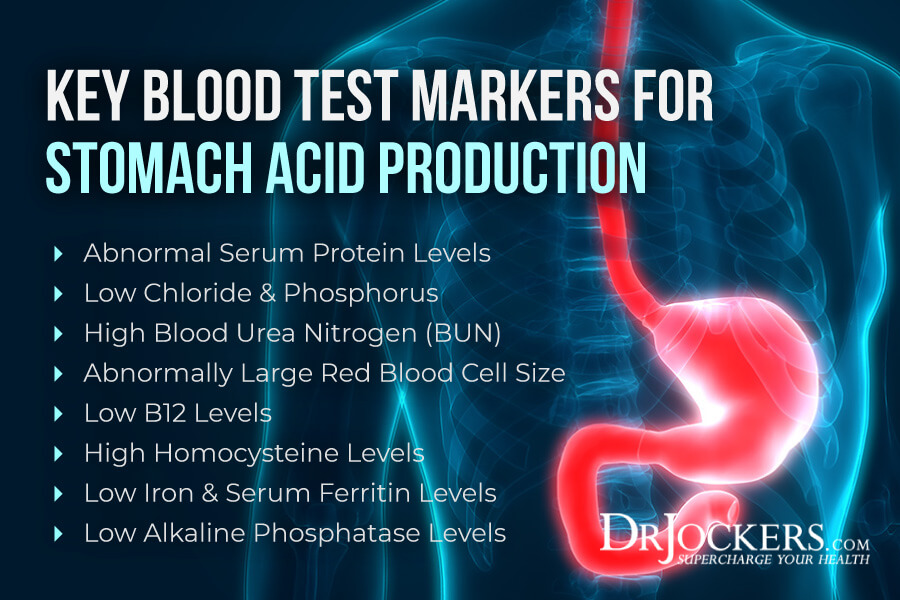
Key Markers for Bile Flow
There are several key markers to look for to check for normal bile flow, including:
High Alkaline Phosphatase: Alkaline phosphatase is a liver enzyme that is made by the mucosal cells that line the bile system of the liver and helps normal bile flow. High alkaline phosphatase is one of the most sensitive markers for sluggish gallbladder or gallstones. If you see this elevated (over 95) and high bilirubin and liver enzymes then think liver and gallbladder problems.
High AST, ALT & GGT: Alanine aminotransferase (AST) is a liver enzyme. When the liver is stressed these enzymes go up. If you have a sluggish gall bladder you may present with elevated AST levels. Normal levels are between 10 and 26 IU/L. Aspartate transaminase (ALT) is an enzyme present in the liver that spills out during times of increased liver stress.
If you have a sluggish gall bladder may present with elevated ALT, AST and GGT levels. Normal levels are between 10 and 26 IU/L. Gamma-Glutamyl Transpeptidase (GGT) is an enzyme in the liver, pancreas, and kidneys. It is elevated in all forms of liver disease and functionally increased due to alcoholism and/or sluggish gallbladder or gallstone obstruction. Normal levels are between 10 and 26 IU/L. Levels lower than 10 IU/L can be an indication of a vitamin B6 deficiency.
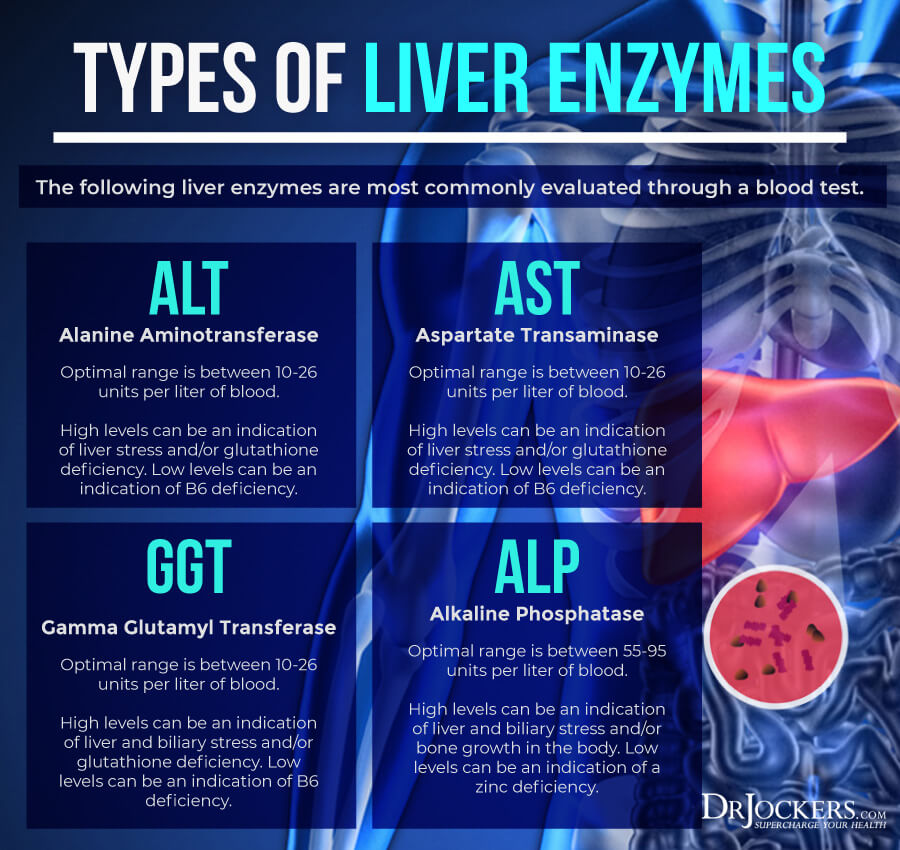
High Bilirubin: High bilirubin is the byproduct of hemolysis (RBC destruction) and the result of the breakdown of hemoglobin. Bilirubin is excreted in bile and urine, and elevated levels may indicate certain diseases.
It causes yellow color of bruises and the yellow discoloration in jaundice and the brown color of feces. Increased levels are typically the signs of liver, gallbladder, or spleen dysfunction. High levels can be broken down into conjugated and unconjugated with additional testing to determine the cause.
High conjugated bilirubin and elevated liver enzymes may indicate gallbladder problems. High unconjugated bilirubin may be caused by a spleen disorder or hemolytic anemia.
Elevated bilirubin with normal liver enzymes may indicate a genetic disorder called Gilbert’s syndrome which is a harmless condition where the liver has poor bilirubin processing and a mild state of jaundice. In certain cases, this may be an indication of poor bile flow and bile flow support nutrients should be considered. Normal levels are between 0 and 1.2 mg/dL.
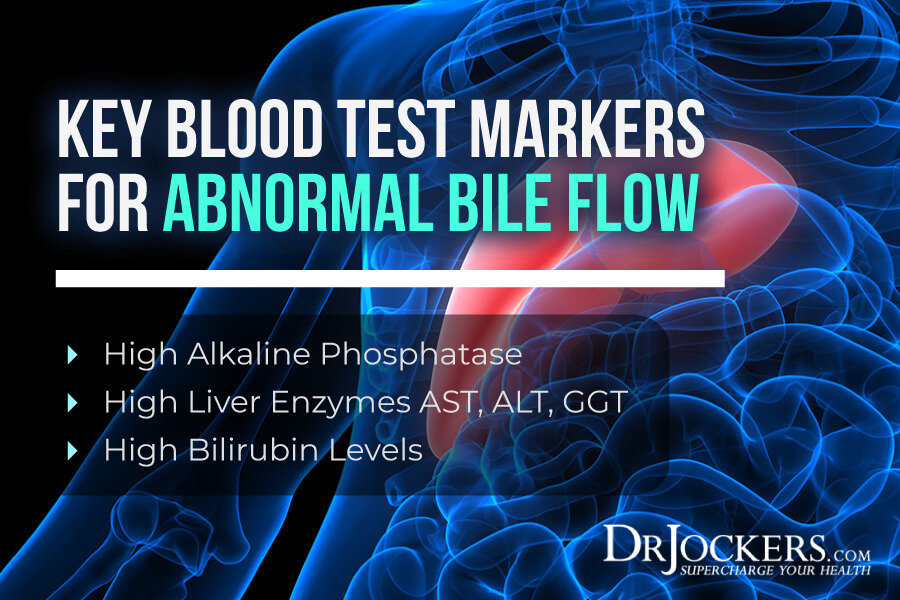
GI MAP Stool Test
Along with a Comprehensive Blood Analysis, I also recommend a GI Map Stool Test for digestive health testing. This will help you to further understand your digestive health and help appropriate lifestyle changes for improved digestive health. I recommend that we look at several important digestive health factors, including:
Elastase-1: Eastase-1 is an enzyme produced by the exocrine tissue in your pancreas. Testing for elastase-1 in your stool can help to determine the function of your pancreas. Low levels may indicate pancreatic insufficiency. Healthy levels are over 200 ug/g.
Steatocrit: Seatocrit is an indication of the amount of fat in the feces. High levels may indicate pancreatic insufficiency. Normal levels are under 15 percent.
Secretory IgA: Secretory IgA is a major antibody found in bodily secretions and line the small intestines. Low levels may mean poor immune function. Normal levels are between 510 and 2010 ug/g.
Anti-Gliadin IgA: Anti-Gliadin IgA is used to measure gluten in foodstuff. People with celiac may present high levels. Normal levels are between 0 and 100 U/L.
Calprotectin: Calprotectin helps to detect inflammation in the gut. High levels may indicate irritable bowel disease (IBD), infections, or other gut health issues. Normal levels are under 173 ug/g and optimal levels are under 50 ug/g
b-Glucuronidase: D-Glucuronidase helps to break down complex carbohydrates. High levels may indicate gut bacteria overgrowth. Normal levels are under 2486 U/mL and optimal levels are under 1123 U/mL
Final Thoughts
Your digestive health is critical not only for proper digestion and nutrient absorption, but your entire body and overall health. Your digestive health affects your immune function, brain and neurological health, energy levels, skin health, and all areas of your well-being.
For your digestive health testing, I recommend that you try the at-home tests, Comprehensive Blood Analysis, and the GI Map Stool Test. These will help you to understand your digestive health better, detect potential problems, and assist appropriate dietary and lifestyle changes to support your digestive health and improve your well-being.
If you want to work with a functional health coach, I recommend this article with tips on how to find a great coach. On my website, we offer long-distance functional health coaching programs. For further support with your health goals, just reach out and our fantastic coaches are here to support your journey.
Inflammation Crushing Ebundle
The Inflammation Crushing Ebundle is designed to help you improve your brain, liver, immune system and discover the healing strategies, foods and recipes to burn fat, reduce inflammation and Thrive in Life!
As a doctor of natural medicine, I have spent the past 20 years studying the best healing strategies and worked with hundreds of coaching clients, helping them overcome chronic health conditions and optimize their overall health.
In our Inflammation Crushing Ebundle, I have put together my very best strategies to reduce inflammation and optimize your healing potential. Take a look at what you will get inside these valuable guides below!



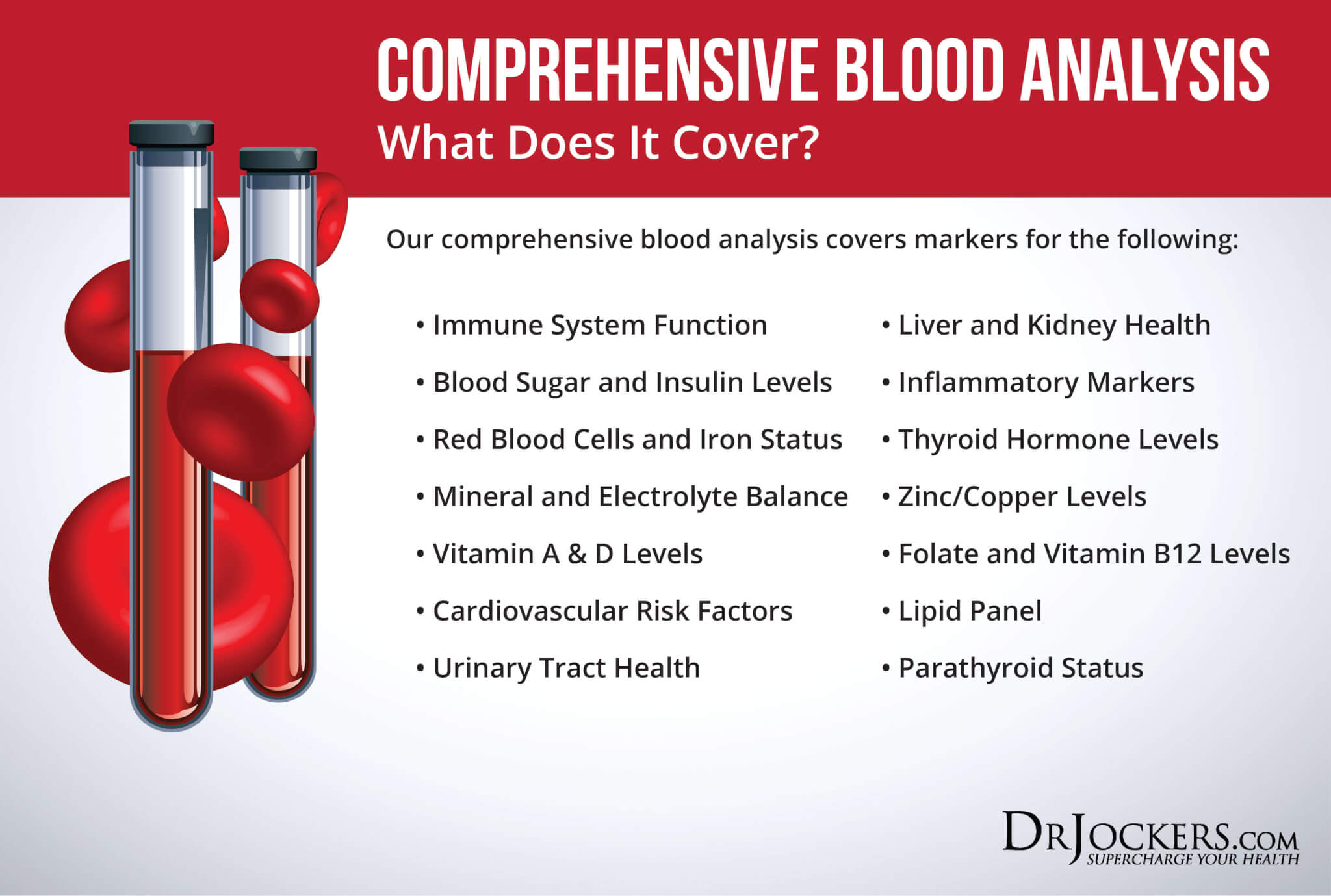

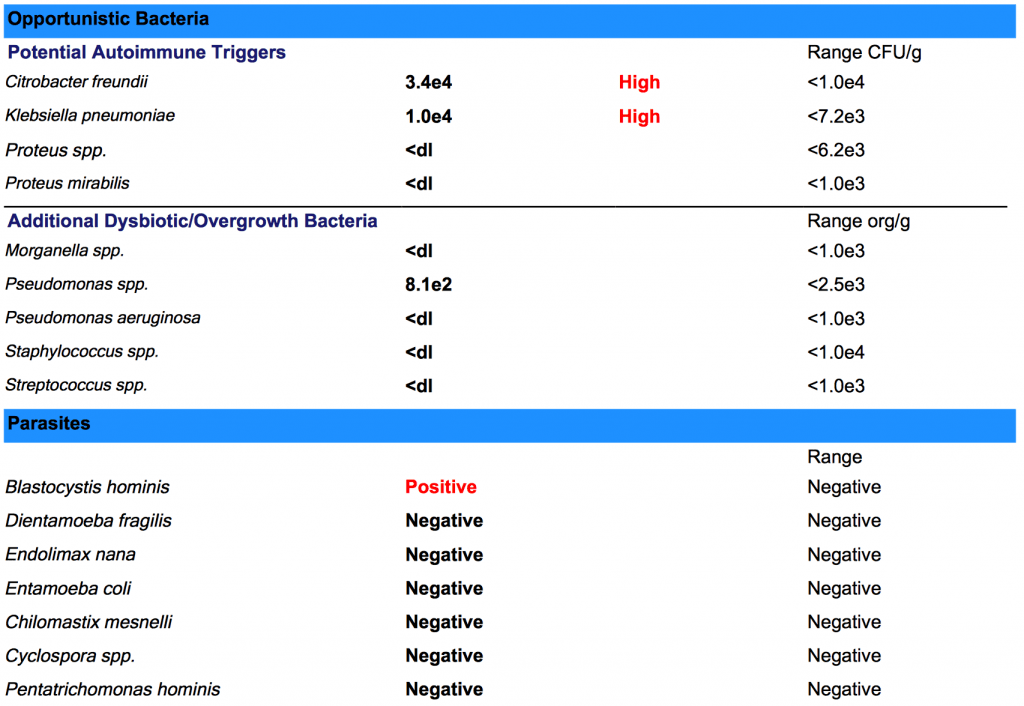




Do I need to do the broccoli or steak test in a fasting state?